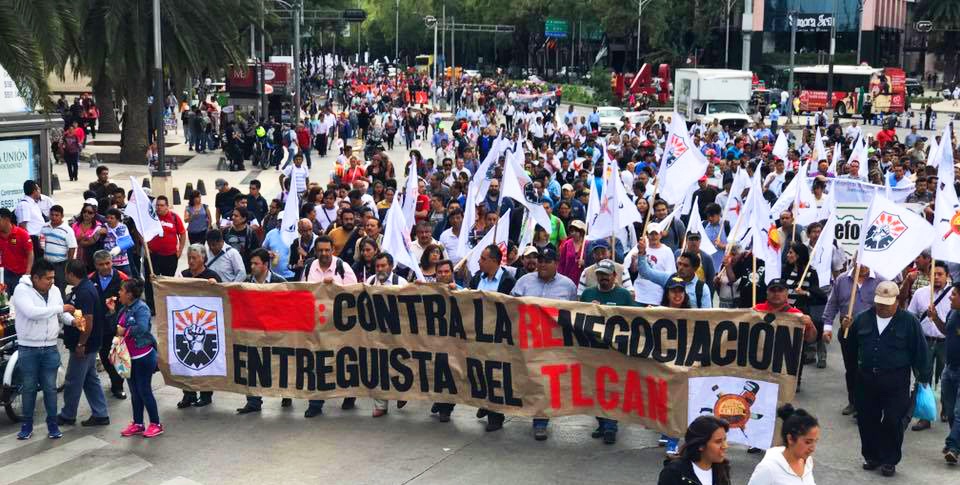22 August, 2017Trade unions affiliated to IndustriALL Global Union in Mexico, together with education workers and small farmers’ organizations, staged a march on 16 August against the renegotiation of the North American Free Trade Agreement (NAFTA).
The march was organized to coincide with the first round of negotiations, being held in Washington, to modernize the North American Free Trade Agreement (NAFTA) between Canada, the US and Mexico. The mobilization in Mexico City began just hours after the talks were launched in the United States.
The march started at the city’s emblematic Angel of Independence monument and culminated at the Secretariat of Foreign Affairs. Around 2000 people representing free and democratic trade unions attended the march.
On reaching the secretariat, the protestors read out a manifesto, which they then handed over to the department of foreign affairs. The text proposes that rather than modernising NAFTA, the parties should work towards a cooperation and complementation agreement that does not leave everything in the hands of the market.
“We are seeking a new form of integration within a global dynamic that benefits all peoples and the planet. We are proposing a new agreement that contributes to strengthening the domestic economy and diversifying Mexico’s external relations, an agreement that respects the national sovereignty of the three countries and recognizes the right to self-determination,”
said Humberto Montes de Oca, foreign relations secretary of the Mexican electrical workers’ union Sindicato Mexicano de Electricistas (SME), affiliated to IndustriALL.
The main premise is that since the treaty took effect, in 1994, it has undermined workers’ rights. They point out that NAFTA has led to the marginalization of small farmers and has contributed to impoverishing the country and its workforce.
Paradoxically, during the talks scheduled to take place between now and the end of the year, the United States is planning to put pressure on Mexico to raise its labour standards and wages, with a view to preventing “unfair competition” with US workers.
“This is owed to the fact that the original treaty had considered a parallel agreement to protect workers’ rights, but it was never included or formally respected within the trade agreement,”
explained Napoleón Gómez Urrutia, president of Los Mineros miners’ union and joint regional president of IndustriALL.
Urrutia believes that what Mexico really needs is a progressive labour reform “that brings about profound rather than superficial change, which will not only provide genuine protection for workers’ fundamental rights but also for democracy and freedom of association”.
The demonstrators also condemned the federal government for failing to call on the workers to elect representatives to take part in the renegotiation of the free trade agreement and holding the talks behind closed doors.
“Negotiations that will determine our future should not be carried out in a hurry and in secret. We are demanding that the roadmap and the terms of the negotiations be made public, and that final approval should not be given without broad consultation of all sectors of society,”
insisted Montes de Oca.
The government unilaterally appointed a leader from a pro-employer trade union centre, the Confederación de Trabajadores de México (CTM), which does not represent workers’ interests.
IndustriALL director, Fernando Lopes, commented:
“This is a crucial time for us to strengthen the alliance between trade union and social movements in the United States, Canada and Mexico. The governments will try to pit the workers against each other, but they will not succeed. Workers of the three countries will stand united in defence of their rights!”
